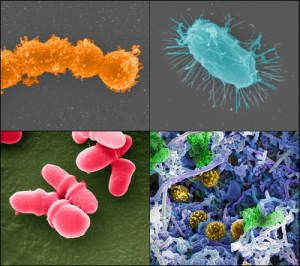Digestive system: microbiome
Learning Objectives
Understand how microbiomes affect your health
Understand how microbiomes keep you healthy
Vocabulary:
- Microbiome
[This video was copied from the original link the creator uploaded, not from “Murray Middle School” youtube list.]
A microbiome is a community of microorganisms such as bacteria, fungi, and viruses that live inside an organism. In particular, we will be talking about the human microbiome.
The microbes that make up the microbiome can be found everywhere in our body from our mouths to our gut and even to our skin. The microbiome is formed from the second we are born. Our body picks up all sorts of microbes for the next three years until we have a healthy, stable, and mature microbiome. All the microbes work together to complement the functions of one another. For example, some microbes work to help aid digestion and others strengthen the immune system.
The microbiome affects our health in so many different ways. To begin, microbes help boost your immune system meaning you will get sick less often. Researches have found a specific bacteria in the digestive tract that bunds to immune system cells and stimulate them to divide and reproduce. They have also found that, in the future, if you have a weakened immune system, doctors can introduce these bacteria into your system to give it a boost. Microbes are also known to keep us slim. They play an important role in helping us digest food and produce chemicals that shape our metabolic rate. Researchers have even stated that disturbances in our microbiome are one factor that can lead to obesity. Lastly, microbes keep babies healthy. Recent studies show that babies born through C-section have different microbiomes than those that are born traditionally. This is because the traditional birthing process allows babies to gain microbes from their mothers. Babies that are born through C-section are more likely to develop asthma and allergies.

Because microbes keep you healthy, here are a few ways you can keep your microbes healthy. You can eat lots of fruit and vegetables. Fruits and vegetables have an amazing source of nutrients for your microbes. They are high in fibers that only your microbes can digest and use to stimulate their growth. Following a diet with different fruits and vegetables may even prevent the growth of disease-causing bacteria. Another way to keep your microbiome healthy is to not eat too many artificial sweeteners. Eating too many sugar replacements can negatively affect your microbiome and then causing you to have an increase in blood sugar and a decrease in insulin response. One last way you can keep your microbiome healthy is by eating foods that are rich in Polyphenols. Polyphenols are essentially plants that have the ability to reduce blood pressure, cholesterol levels, and inflammation. Polyphenols aren’t always digested properly so once they reach the colon your microbiome absorbs more of it to give themselves nutrients. Foods that are a good source of polyphenols include dark chocolate, green tea, almonds, onions, blueberries, and broccoli. In addition to these three methods to keep your microbiome healthy, there are also multiple different ways to keep your microbiome healthy as well! All you have to do is do a quick search for ways to keep your microbiome healthy and find what works for you.

Figure 1 Image credit: “Human Microbiome Project (HMP)” by National Institutes of Health (NIH) is licensed under CC BY-NC 2.0
Figure 2 Image credit: “Divine Mint Dark Chocolate” by Boz Bros is licensed under CC BY-NC-SA 2.0

